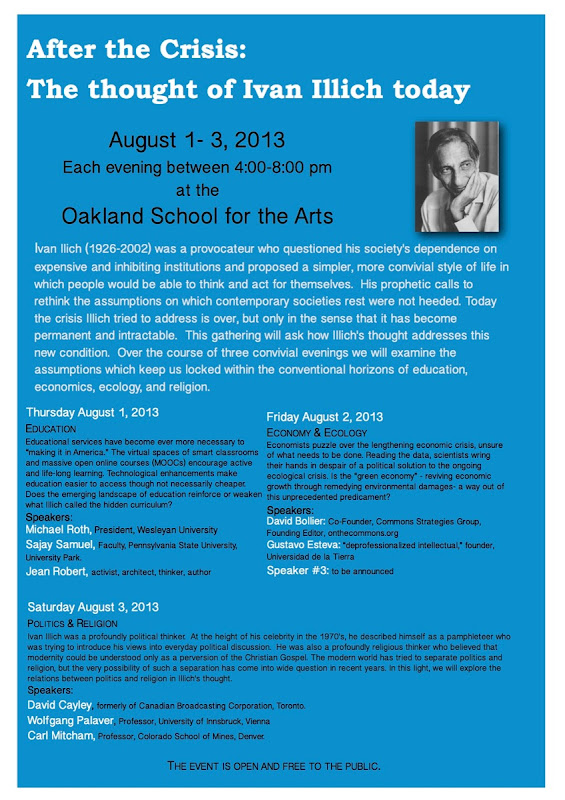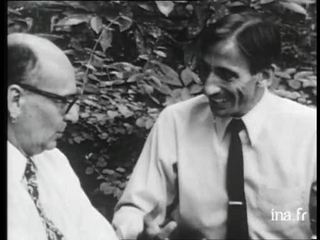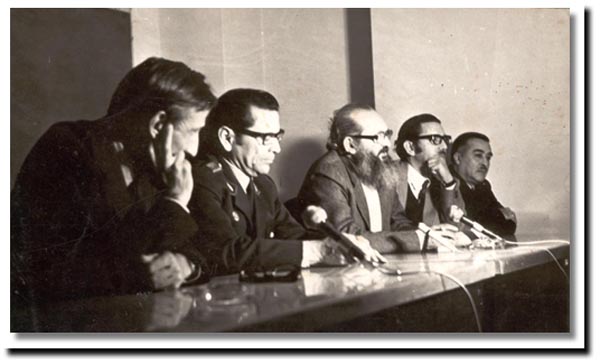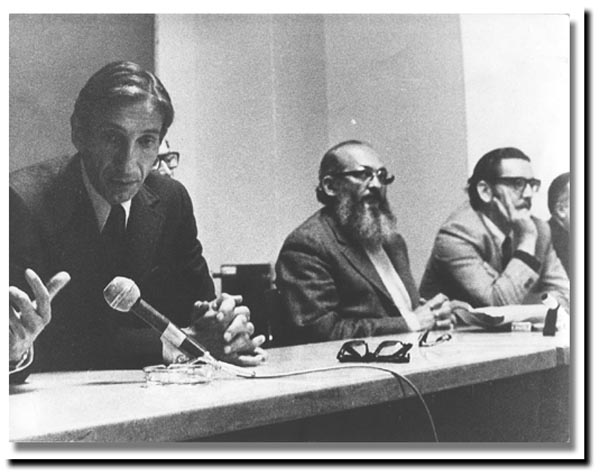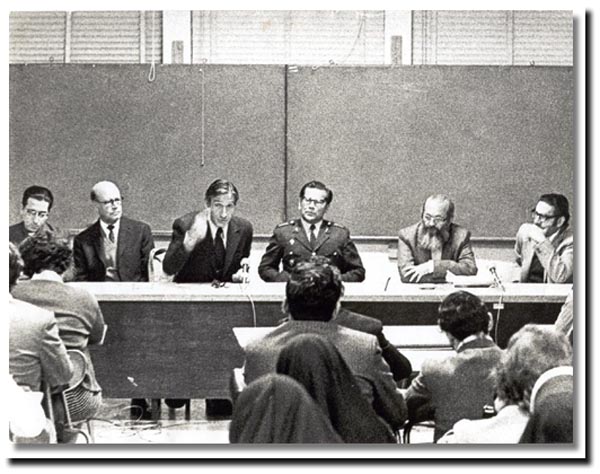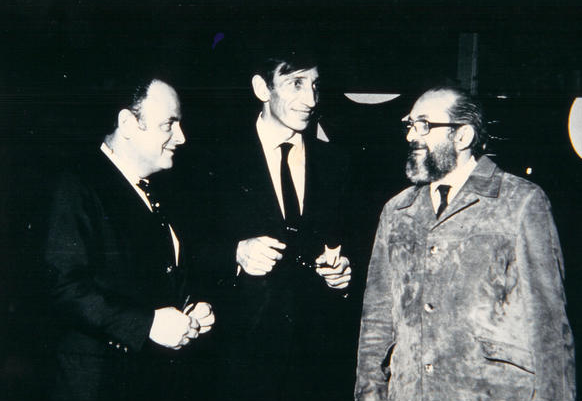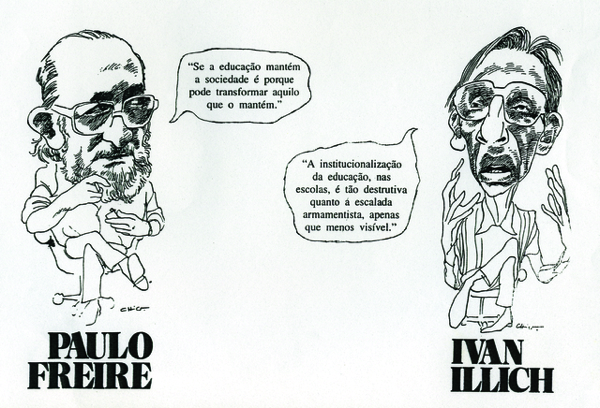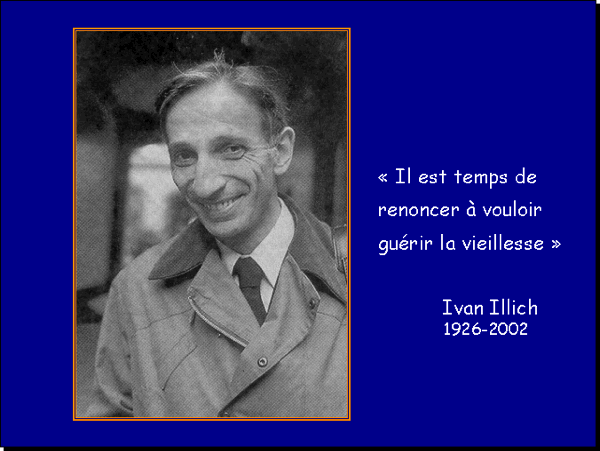A few days ago here, we noted that an hour-long interview with Ivan Illich, filmed for French television in the early 1970s, has shown up on the Web. It is available for viewing at no charge right here.
We now have the pleasure of making available both a transcript of the interview, in French, and a translation of that document into English. Both were prepared by Clarke Mackey, a film maker, professor of film studies at Queens University, in Ontario, and friend of David Cayley's.
The transcript in French may be viewed and downloaded here; and the translation here. (These links will bring you to the Dropbox site.)
Here is the start of the interview. Illich and his interlocutor, Jean Marie Domenach, are standing in a garden, discussing a well-weathered statue of a woman, Pandora.
Illich: You know the story. She came, and there were two brothers: Prometheus, the one who looks ahead, the planner, and his brother Epimetheus, the one who looks back. Prometheus said to Epimetheus, “Leave her be.” But Epimetheus fell in love with Pandora and stayed with her, who, as the story goes, opened her amphora. According to Hesiod, all of the words flew out, and Epimetheus remained with the only gift that didn’t escape, hope. We rarely see him again in classical mythology; since that time, all of classical mythology has focused on the future, on the attempt to put all of the words let out by the classical Pandora back into a box. The man Epimetheus develops by trying to turn his attention away from Pandora and onto the words and by trying to create a world where we have what I call institutions, sanctuaries to hold the different words that were originally released.
I think that the story of Pandora, I repeat, the story of Pandora is the best story about how man went from trusting in the Delphos of the earth, from interpreting dreams and images, to become man that plans. You know that Delphi later became the main centre for planning because all of the, how do you say it—
Domenach: The Greeks.
Illich: Yes, the Greek cities were founded where the priests of Delphos said they should be founded. They had more knowledge than most because everyone came to Delphi to tell their stories, so the priests were able to give the right advice like planners do nowadays by listening to what was being said among the people and predicting for the future what they already saw in the present.
On her genital area you can see the serpent with death for a head. This woman’s womb was placed in her hands, and it became a moneybox. To me, she is one of the most fascinating figures in Western history. I think that the entire rise of capitalism, what I call capitalism in the broadest sense of the word, can be studied by knowing this woman. In today’s world, if we don’t turn back to Pandora Gea, who lives, who lived, and I believe still lives in her cave at Delphos, if we don’t regain our ability to recognize the dream language she can interpret, we are condemned; the world cannot survive.
Look at what happened in the cave when her womb became a box. Male priests of Apollo came from Asia Minor and replaced Pandora by putting a little girl on the tripod in her cave, a girl that they took prisoner, that they drugged to make her say things, and then predicted the future like modern-day engineers in hexametric verse. I have the impression that today we’re seeing a new Pythia in a different form—a new Pythia has been established in the form of the computer, the calculator, the electronic machine that speaks to us not in hexameters, but in dodecameters with its rhythm of 12 bits per unit. It’s the end of the world. It’s the final, ultimate conclusion that we’ve reached by substituting the Pythia, the world that understood Pandora as the holder of a box, for the ancient Mother Earth that we now see—our generation, at least young people again—as the blue star that we gaze upon with nostalgia from the moon.
This degenerate Virgin Mary was brought to Mexico by the Spanish, in her degenerate form as granter of mercies, but there the Spanish found a different goddess, Tonantzin, a very different understanding of the world according to another primitive people. The Spanish associated the Virgin Mary with Tonantzin, just as the first Christians associated the Virgin Mary with the Hellenistic Gaia, very rarely with the ancient Pandora, Gea Pandora. Tonantzin is a completely different goddess. I see her every day from our balcony.
Domenach: In Cuernavaca.
Illich: Yes, we have the two great volcanoes, Popocatepetl and his wife, Tonantzin Iztaccihuatl; the sun rises each day between her feet. However, it’s a world that we don’t understand here in Europe, because at night, Tonantzin eats the sun and gives birth to the stars; she eats it at night, and that’s why her stomach is full of the bones of ancient eaten stars. You can see the whole problem as well with extending Western culture to the Americas when people try to make associations through symbol, by merging the symbols of the Virgin Mary and the Hellenized Gea with the Neolithic Tonantzin of the Aztecs. But there’s so much to say about that.
Domenach: You’ve talked a lot about these goddesses surrounding us, but throughout our conversation, you haven’t mentioned the name of Christ. Is that done on purpose?
Illich: Well, I prefer not to speak about my friends in a superficial way. And, to take it one step further, I think that nowadays, people tend to use the name of God in vain, usually to justify something. I would rather make it known that I love him without talking about it. It’s almost impossible to do that these days without getting trapped in dangerous, very dangerous ambiguities.
continued ...

